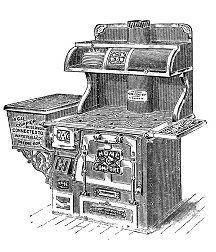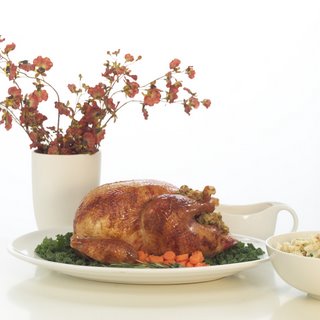 Something which never fails to interest me is what everyday life, especially in the home, was like for people at different times in history.
Something which never fails to interest me is what everyday life, especially in the home, was like for people at different times in history.The cooking stove to the left comes from the Victorian period. In my kitchen library I happen to have a reprint of a book originally published in 1879 titled Housekeeping in Old Virginia. Most of what the book contains is recipes. But in this book the author explains what is needed in a well equipped kitchen of the times. Funny thing is the author didn't mention a microwave. (wink).
Taken from this book:
"The furnishing of a kitchen is so important that I must here say a few words on the subject. First, the housekeeper must have a good stove or range, and it is well for her to have the dealer at hand when it is put up, to see that it draws well."
"Besides the utensils furnished with the range or stove, she must provide every kitchen utensil needed in cooking. She must have a kitchen safe, -- a bread block in the corner, furnished with a heavy iron beater; trays, sifters (with iron rims) steamers, colanders, porcelain preserving kettle, perforated skimmers and spoons, ladles, long-handled iron forks and spoons, sharp knives and skewers, graters, egg beaters (the Dover is the best), plenty of extra bread pans, dippers and tins of every kind, iron moulds for egg bread and muffins, wash pans, tea towels, bread towels, and hand towels, plates, knives, forks and spoons for use of the servants, a pepper box, salt box, and dredge box (filled), a match safe, and last, but not least, a clock."
"In cases where you cannot have cold and hot water conveyed into the kitchen, always keep on the stove a kettle of hot water, with a clean rag in it, in which all greasy dishes and kitchen utensils may be washed before being rinsed in the kitchen wash pan."
"Always keep your cook well supplied with soap, washing mops and coarse linen dish rags. I have noticed that if you hem the latter, servants are not so apt to throw them away. Insist on having each utensil cleaned immediately after being used. Have shelves and proper places to put each article, hooks to hang the spoons on, etc."
"If you cannot have an oil cloth on your kitchen floor, have it oiled and then it may be easily and quickly wiped over every morning. Once a week, have the kitchen and every article in it thoroughly cleaned. First clean the pipe of the stove, as the dust, soot and ashes fly over the kitchen and soil everything. Then take the stove to pieces, as far as practicable, cleaning each part, especially the bottom, as neglect of this will prevent the bread from baking well at the bottom. After the stove is thoroughly swept out, oven and all, apply stove polish. I consider "Crumbs of Comfort" the best preparation for this purpose. It comes in small pieces, each one of which is sufficient to clean the stove once, and is thus less apt to b wasted or thrown away by servants than stove polish that comes in a mass."
"Next remove everything from the kitchen safe and shelves, which must be scoured before replacing the utensils belonging to them, and these too must first be scoured, scalded, and wiped dry. Then wash the windows, and lastly the floor, scouring the latter unless it is oiled, in which case, have it merely wiped over."
"Never let a servant take up ashes in a wooden vessel. Keep a sheet-iron pan or scuttle for that purpose. At night, always have the water buckets filled with water and also the kettles, setting the latter on the stove or range, in case of sickness or any emergency during the night. Have kindling wood at hand also, so that a fire may be quickly made, if needed."
So there you have it ladies. If ever you should acquire a Victorian kitchen in the future, you will know how to equip it and keep it clean. If ever you should acquire a Victorian kitchen, I hope and pray you have servants to go along with it. Looked like a lot of work to me.
